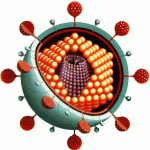Virology
|
17 november 2015 19:33:32 |
| ATP generation in a host cell in early-phase infection is increased by upregulation of cytochrome c oxidase activity via the p2 peptide from human immunodeficiency virus type 1 Gag (Retrovirology) |
|
Tweet Background:
Human immunodeficiency virus type 1 (HIV-1) must take advantage of its own proteins with two or more functions to successfully replicate. Although many attempts have been made to determine the function of viral proteins encoded in the HIV-1 genome, the role of the p2 peptide, a spacer between the capsid and the nucleocapsid in HIV-1 Gag in early-phase HIV infection still remains unclarified.
Results:
In this study, we show that the p2 peptide enhances HIV-1 acute infection by increasing intracellular ATP production via the activation of mitochondrial cytochrome c oxidase (MT-CO) involved in the respiratory chain. We found that cell-permeable p2-peptide-treated cells were more effectively infected by HIV-1 than control cells. To characterize the effect of the p2 peptide on HIV-1 replication in MAGIC-5 cells, various HIV-1 cDNA products were measured by quantitative real-time PCR. The levels of the late (R/gag), 2-LTR circular (2-LTR), and integrated (Alu) forms of viral cDNAs increased in the presence of the p2 peptide. Interestingly, yeast two-hybrid analysis revealed a novel interaction between the p2 peptide and the mitochondrial intermembrane space domain (N
214
–F
235
) of MT-CO subunit I (MT-CO1). Mutational analysis indicated that Gln
6
in the p2 peptide is important for the interaction with MT-CO1. The p2 peptide activated MT-CO1 in vitro in a concentration-dependent manner, and fluorescence-microscopy analysis demonstrated that the p2 peptide had a significant effect on mitochondrial targeting. Furthermore, the analysis of HIV-1 lacking a functional p2 peptide demonstrated the inhibition of intracellular ATP production in MT-4 cells and monocyte-derived macrophages (MDMs) and a decrease in reverse transcription efficiency following infection of MT-4 cells and MDMs.
Conclusions:
These findings provide evidence that the p2 peptide is a viral positive allosteric modulator of MT-CO and the increased intracellular ATP production after HIV infection in a p2-peptide-dependent manner is essential for efficient reverse transcription in early-phase HIV-1 infection. |
| 140 viewsCategory: Virology |
 Recombination elevates the effective evolutionary rate and facilitates the establishment of HIV-1 infection in infants after mother-to-child transmission (Retrovirology) Recombination elevates the effective evolutionary rate and facilitates the establishment of HIV-1 infection in infants after mother-to-child transmission (Retrovirology)Lack of a significant impact of Gag-Protease-mediated HIV-1 replication capacity on clinical parameters in treatment-naive Japanese individuals (Retrovirology) 
|
| blog comments powered by Disqus |
MyJournals.org
The latest issues of all your favorite science journals on one page
The latest issues of all your favorite science journals on one page



